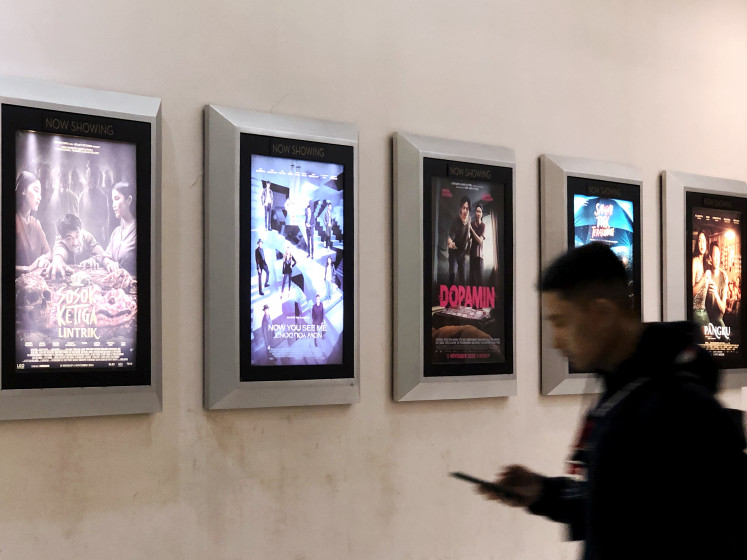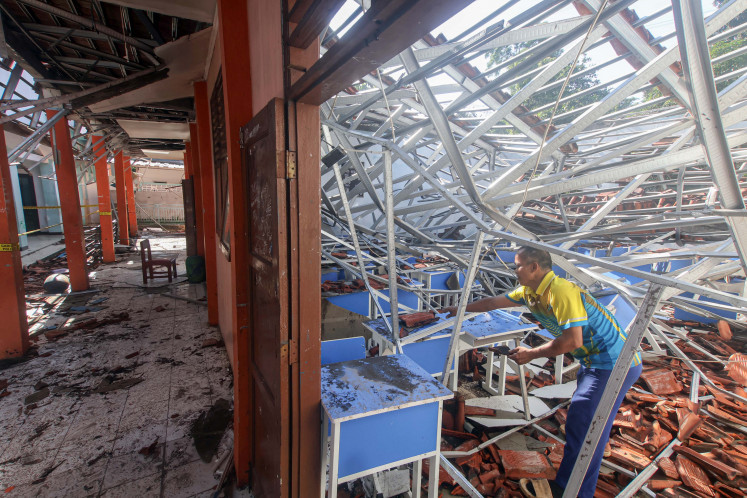Popular Reads
Top Results
Can't find what you're looking for?
View all search resultsPopular Reads
Top Results
Can't find what you're looking for?
View all search resultsThe bloody hands of Papuan separatist groups
The ancient philosopher Laozi wrote that a journey of a thousand miles begins with a single step
Change text size
Gift Premium Articles
to Anyone
T
he ancient philosopher Laozi wrote that a journey of a thousand miles begins with a single step. Indonesia still faces obstacles in protecting the human rights of its citizens. This is a nationwide legacy problem that the government of President Joko “Jokowi” Widodo is determined to address one step at a time.
Recently, the President personally instructed relevant government agencies to take actions to settle past human rights abuse cases, including those related to Papua, and to put in place safeguards to prevent future incidences.
Leading an interministerial meeting last April, chief security minister Luhut Pandjaitan listened to views and reports from human rights activists and Papuan public officials. Paulus Waterpauw, an ethnic Papuan and police chief of Papua, is leading the efforts to resolve four cases of alleged rights abuses.
The National Police chief, the attorney general and the national rights body are in charge of another five cases. Indonesian courts have prosecuted and convicted a number of individuals for rights abuses, including those committed by members of security forces.
This is a small move on the path to resolve a number of past cases of alleged unjustified killings. Prosecution sends a strong message that no one is above the law, and in turn discourages potential rights abuses.
Rights abuses are not monopolized by security forces, however. The United Liberation Movement for West Papua’s (ULMWP) sole agenda is to take possession of Indonesia’s sovereign territories of Papua and West Papua. In pursuit of that goal, it is waging an international propaganda campaign.
As part of its strategy, the armed faction of the Papuan separatist group including the West Papua National Liberation Army (WPNLA), the Purom Okinam Wenda Group and their affiliates are systematically conducting armed attacks designed to terrorize Papuan residents, Papuan police and security personnel as well as local and multinational businesses.
ULMWP spokesperson Benny Wenda is himself a fugitive from the law, wanted on charges of his involvement in attacks that killed a police sergeant and a security guard in Abepura in December 2000.
This separatist group has committed many rights abuses including toward ethnic Papuans. A number of Papuan casualties, who are repeatedly used by the ULMWP in their smear campaigns, are often a result of armed conflict between the police and the armed WPNLA and its affiliates.
To illustrate, in March 2016, an armed separatist group of 20 people ambushed workers building a road to connect the cities of Sinak and Mulia. Four workers died from gunshot wounds.
On Nov. 30 last year, separatists attacked military officers in Mamberamo Raya. One officer, Maj. Jhon E. deFretes, who was also a priest, died from his wounds. On July 28, 2014, the Lanny Jaya faction of the WPNLA attacked eight police officers who were travelling for a community counseling program. Two officers died from gunshot wounds.
On July 31, 2013, an armed separatist group linked to the Purom Okinam Wenda Group attacked civilians only 100 meters from an Army station. The group attacked and shot at an ambulance owned by the Puncak Jaya Hospital and killed a health worker from the local hospital.
On Nov. 27, 2012, an armed separatist group attacked and burned a police station in Lanny Jaya. Three police officers died of gunshot wounds and burns. The list goes on and on.
Consider this hypothetical scenario. Suppose a group of seemingly peaceful people held a rally in front of Port Vila Parliament House in Vanuatu. The group waved the Islamic State (IS) movement flag, calling for the establishment of an Islamic caliphate in the country.
On a different day, the group’s more extremist faction wielding automatic rifles attacked and killed a number of police officers patrolling the market and a number of shoppers doing Easter shopping. How would the Vanuatu police react?
They would probably take the demonstrators in for questioning. The police would possibly scour the suspects’ neighborhoods to obtain leads. Maybe the police would conduct a house-to-house search, and perhaps be forced to resort to using lethal force to stop the terrorists in their tracks.
How is this any different from the reaction of the police in Papua toward those groups of people who are not just peacefully calling for their goal, which threatens national security and the existence of Indonesia as a sovereign country, but their violent and extremist wing that does not hesitate to use lethal force against Papuan civilians and the police?
We should reject the use of terrorism for any purpose, whether to establish an Islamic state or to break up Indonesia and establish a new state in place of its territories.
Note that the ULMWP aims to take possession of territories of a sovereign country. Let us not forget that Papuan voters have fairly and freely elected their government and legislature.
Let us not forget that the ULMWP seeks to overthrow this democratically elected government and the people’s representatives for its own political agenda.
Two wrongs do not make a right. The Indonesian government is taking steps on that thousand-mile journey.
Are the ULMWP and its armed wing taking any actions to right what is wrong?
________________________________
The writer is the spokesperson for the Indonesian Embassy in Canberra.










